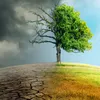[Sustainability Agenda] How these teenagers are changing the way we talk about climate crisis
Delhi-based students Anushree Pratap and Tisya Dewan started Nitara — a youth organisation that undertakes various climate-related projects to bring social, educational, and environmental change.
For the past few years, Delhi-based students — Anushree Pratap (19) and Tisya Dewan (17) — have been working with various environmental organisations.
Having been part of many educational initiatives, the duo realised environmental courses taught in schools and colleges lack climate literacy.
Intending to do something about it, Anushree and Tisya started Nitara (means deeply rooted in Hindi) in June 2021. Nitara is an intersectional youth initiative that undertakes various projects under the domains of environment and climate justice, equitable education, and social welfare.

“We started Nitara to work on climate literacy because we realised how much it's lacking in the present scenario. In fact, a lot of it is inaccessible, including jargon used in climate-related conversations. The information taught in schools is more like an afterthought and is not core-centric,” says Anushree, a political science and environmental studies student at Ashoka University.
The girls believed the subject should be taught to students early on, and were on a mission to provide a broader scope to environmental courses to children and adults.
Projects
Anushree says, “We are trying to make a website of resources. Since climate reporting in India is lacking, we started working on a youth newsletter, solely focused on reporting social and ecological injustice issues, which we felt was necessary at this point of time.”
At present, Anushree and Tisya, along with their team, are working on two simultaneous projects. The first project, Eco-Net, falls under the domain of climate literacy, where the team makes resources available under structured modules and puts them on its website.
For the next few years, Nitara aims to build a curriculum to pitch to state school boards.
“We have divided the curriculum into modules, and our volunteers research under each module so that people interested to learn about climate change in India can read them through these modules. We also have quizzes and other interactive activities. Once the work on modules is done, we will reach out to schools to conduct workshops,” Anushree explains.
The second initiative, Green Column, is a monthly newsletter, which brings youth voices to the forefront, giving adequate coverage to climate issues in India often ignored by the mainstream media.
Initially, Nitara’s volunteers contributed to the newsletter. However, now, the team is reaching out to various youth organisations and activists —impacted by climate change — making it a collaborative effort.
Both climate resources and the newsletter are available on Nitara’s website for public viewing.
Scaling up
Presently, Nitara’s biggest challenge is to become more inclusive. Being an online media, all of its contents are in English. However, it is working on translating its content as Nitara’s team is spread across India and speaks multiple languages.
Additionally, since the team is young, Nitara’s team did not have anyone with a Masters or PhD degree in environmental sciences to guide them while preparing the resources.
To date, the team of volunteers have done most of the work by themselves. Nonetheless, Nitara is trying to tie up with research organisations in environmental studies in India so it can have an advisory board in place.
Starting with 8-10 volunteers, Nitara now has 20-25 volunteers spread across India from Kashmir to Bengaluru — comprising of youths of all age groups.
With the founders being students and not earning any income, the duo is working with fewer resources. However, they wish to get funding for the organisation eventually.
“Word of mouth and social media campaigns have attracted more people to join us. Moreover, we don't place any barriers to entry. If you are interested and enthusiastic about it, then anyone can join us, even if they are inexperienced,” says Anushree.
Nitara’s Instagram followers have now grown to over 230 in the last few months, and it has been able to make collaborative conversations through various campaigns and social media lives.
Going forward, Anushree adds, Nitara will launch more projects. However, now, it is focused on expanding its current two projects. Moreover, it plans to have frequent panel discussions with experts on different issues.
Edited by Suman Singh

![[Sustainability Agenda] How these teenagers are changing the way we talk about climate crisis](https://images.yourstory.com/cs/5/79900dd0d91311e8a16045a90309d734/CopyofImageTagsEditorialTeamMaster-1637160234010.jpg?mode=crop&crop=faces&ar=2%3A1&format=auto&w=1920&q=75)






